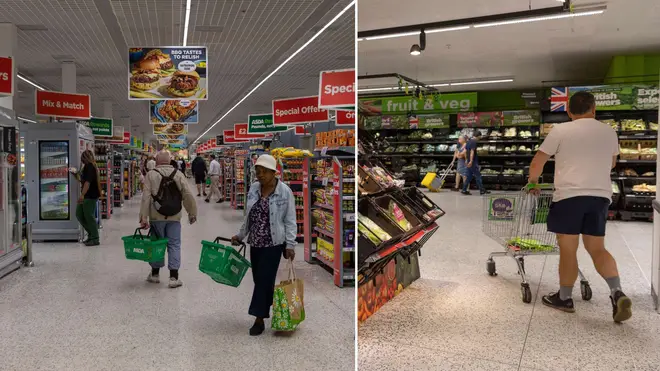
Nick Ferrari 7am - 10am
29 August 2023, 10:30

Inflation for fresh food items has fallen in a boost for squeezed Brits still enduring the cost of living crisis.
It decreased from 14.3% in July, to 11.6% in August, according to the British Retail Consortium (BRC).
New data from the BRC shows that price rises have slowed down to their lowest rate since October last year.
The slowed down price rises do not mean that things are getting cheaper, just that the prices increased more slowly between September 2022 and August 2023 than they did between August 2022 and July 2023.
Read more: Inflation falls sharply to 6.8% from 7.9%, new data shows: What it means for you
The decrease in fresh food inflation contributed to overall retail inflation in August, dropping to 6.9%, from 8.4% in July. However, prices keep significantly increasing.
Particular products that drove the falling food inflation include meat, potatoes and some cooking oils.

Whilst food items that can be stored at room temperature, known as ambient foods, fell from 12.3% in July to 11.3% in August.
Overall food prices slowed from 13.4% to 11.5% while non-food items remained unchanged at 4.7%.
Toiletries and cosmetics had become cheaper, easing price rises in their category but inflation for clothing and footwear increased due summer sales coming to a close.
The consortium's chief executive, Helen Dickinson, said that the slowed down price inflation is "better news for consumers".
However, she added that the figures "would have been lower had the Government not increased alcohol duties this month".
Alcohol duties were increased by 10.1% overall.

Prime Minister Rishi Sunak said that these increases would "protect [the] price of your pint in the pub", whist benefiting "thousands of businesses across the country".
According to the BRC, inflation is set to continue to fall, "thanks to retailer's efforts", says Ms Dickinson.
However, there are supply chain risks retailers need to navigate.
Huw Pill, a chief economist at the Bank of England, noted earlier this month that there may be "some hiccups" with lowering inflation.
He noted Russia’s withdrawal from the Black Sea Grain Initiative and its targeting of Ukrainian grain facilities.
Poor harvests across Europe and beyond could also halt lower inflation, according to Ms Dickinson.
She added that "a potential £400 million hike to business rates bills from next April would certainly jeopardise efforts to tackle inflation unless the Chancellor intervenes".